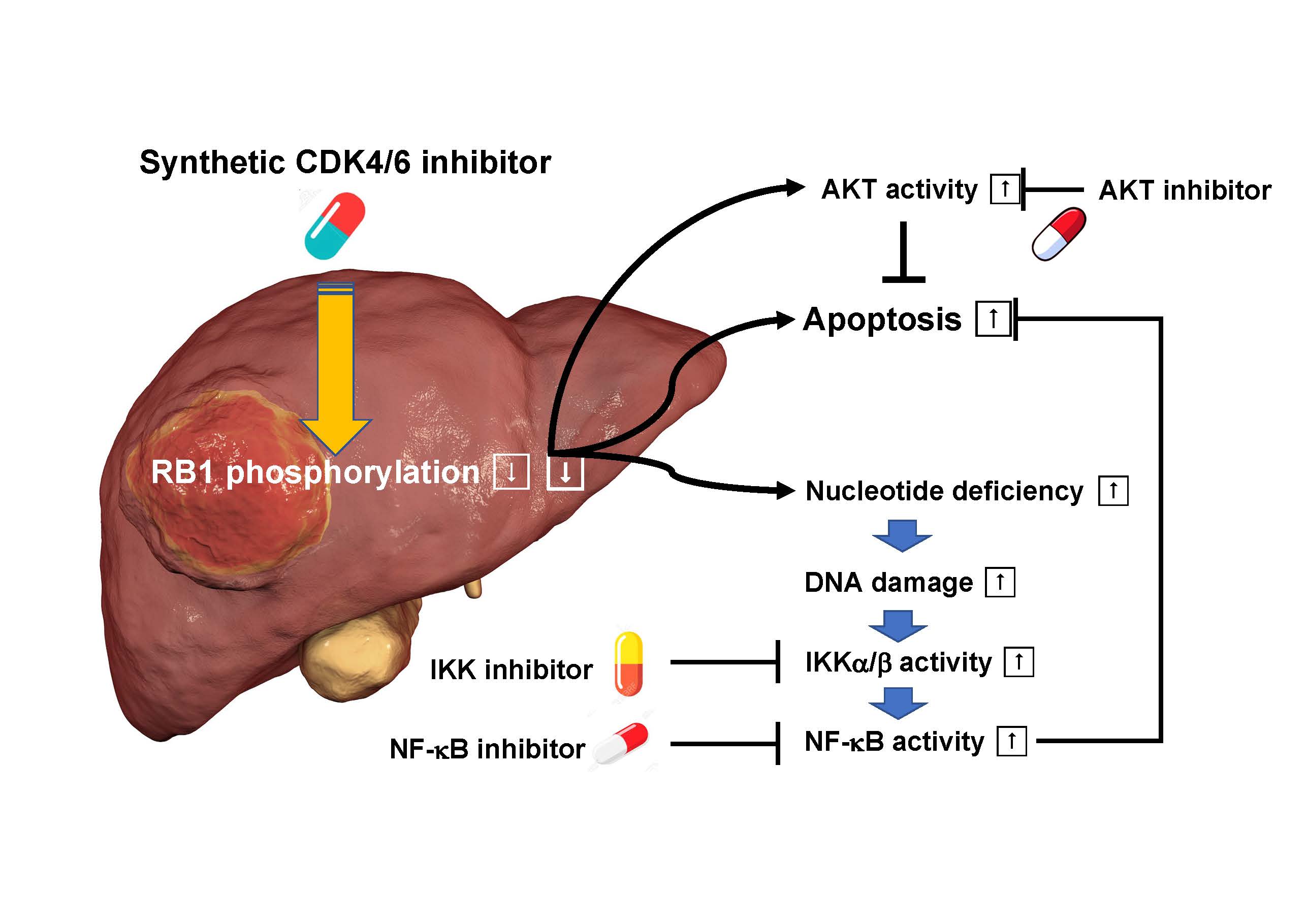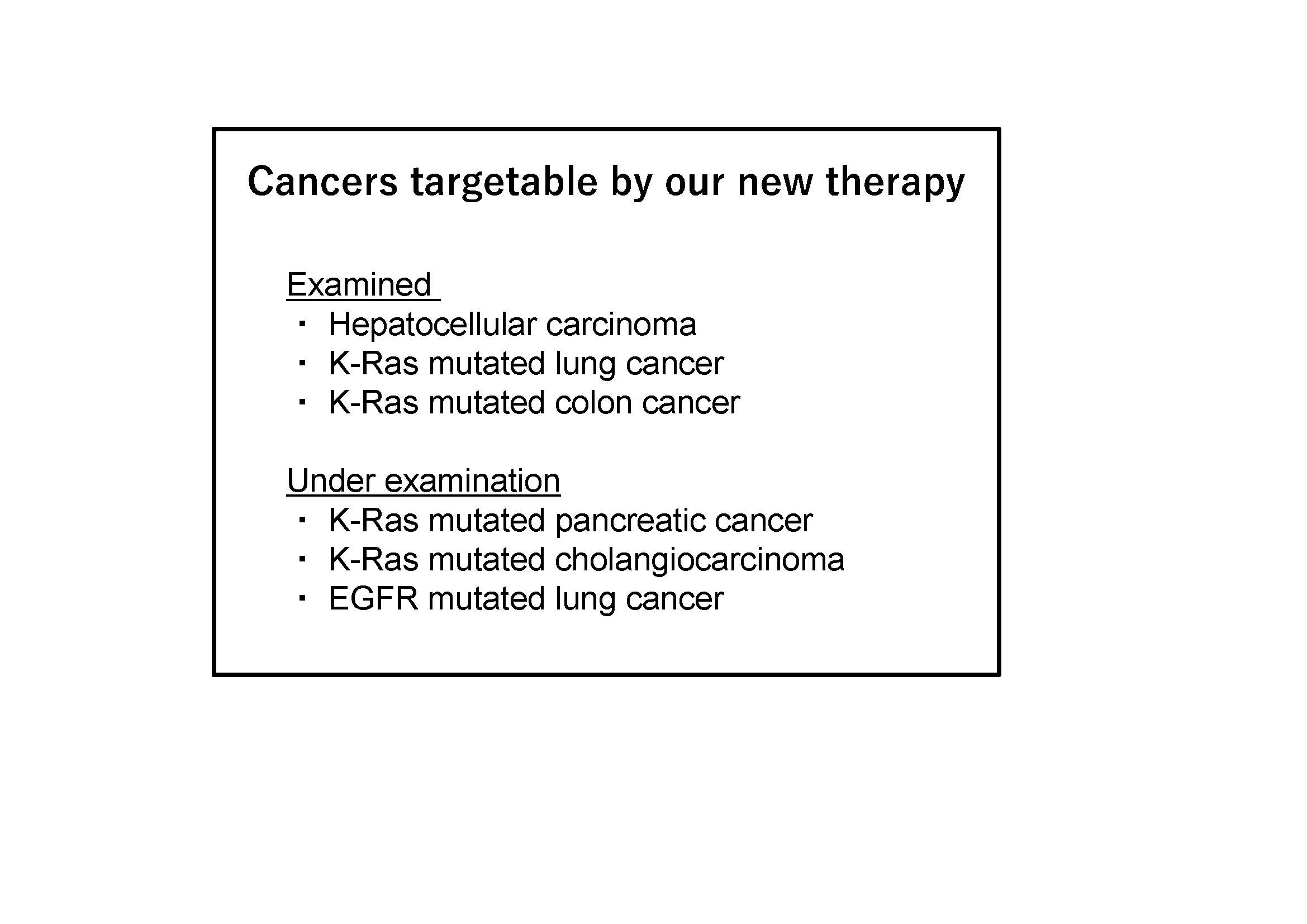Abstract: A synthetic CDK4/6 inhibitor exerts antitumor effects by forcing RB1 tumor-suppressor into an active status, but its single administration is not sufficiently effective. We find its combinatorial administration with an IKKβ inhibitor is significantly more effective in hepatocellular carcinoma treatment. Also, blockage of the IKK-NF-κB or AKT pathway enhances its effects on RB1-intact K-Ras mutated lung and colon cancers. CDK4/6 inhibitors have potential to treat various RB1-intact cancers when combined with an appropriate kinase inhibitor.
[Background]
The RB1 tumor suppressor gene*1) protein antagonizes uncontrolled growth of cancer by suppressing cell cycle progression but its function is repressed in most cancers. CDK4/6*2) represses this function by phosphorylating RB1. In contrast, drugs that inhibit CDK4/6 inhibit the phosphorylation of RB1 and restore the cancer-suppressing function of RB1. However, since it was difficult to achieve a sufficient therapeutic effect by a single administration of a synthetic CDK4/6 inhibitor, development of a combination therapy that maximizes the function of the drug has been awaited.
[Results]
The research team led by Prof. Chiaki Takahashi of the Cancer Research Institute, Kanazawa University, in collaboration with a research team led by Asscociate Prof. Itsuki Ajioka of Tokyo Medical Dental University and with scientists from several domestic and overseas institutions found that hepatocellular carcinoma is generated due to loss of RB1 function in mouse hepatocytes. Then, they established cell lines such as hepatocellular carcinoma into which a mutation that mimics a state in which RB1 is constantly activated was introduced, and performed high-throughput screening in order to find a compound that enhances the effect of a synthetic CDK4/6 inhibitor. As a result, they found that an IKKβ inhibitor shows such an effect. This weakens the function of IKKβ kinase and allows cells to escape from cell death. It was found that when treated with a synthetic CDK4/6 inhibitor alone, IKKα/β and its downstream NF-κB, which detect abnormalities triggered by nucleic acid synthesis deficiency, were activated to avoid cell death, causing insufficient therapeutic effects. Next, they performed similar analyses for K-Ras oncogene*3) mutated lung cancer and colorectal cancer having intact RB1 and found that combined use of another drug that inhibits another kinase, AKT, is effective in a way similar to that obtained by combined use of an IKKβ inhibitor.
[Future prospects]
The synthetic CDK4/6 inhibitors are already covered by health insurance in Japan and the IKKβ inhibitor and the AKT inhibitor are also in clinical trials. Therefore, it is possible to start clinical trials using these drugs in combination with a synthetic CDK4/6 inhibitor. Based on the results of the present study, it is expected that treatments for hepatocellular carcinoma, K-Ras oncogene mutated lung cancer, colon cancer, pancreatic cancer, cholangiocarcinoma, and many other RB1 wild-type refractory cancers will be improved. Currently, we are calling for various clinical departments to participate in cancer therapy trials.

Figure 1. Principle of new therapeutic treatment

Figure 2. Target cancers for the new therapeutic treatment for the time being
[Glossary]
*1) RB1 tumor suppressor gene
Germline or sporadic abnormality in the RB1 gene causes cancer such as retinoblastoma. Under normal conditions, the RB1 tumor suppressor gene suppresses uncontrolled growth of cancer by suppressing the expression of cell cycle genes. The RB1 tumor suppressor gene product is inactivated in a reversible manner in various cancers.
*2) CDK4/6
Cyclin-dependent kinases 4 and 6 are collectively referred to as CDK4/6. When cyclin D is upregulated by cell proliferation signaling and these kinases are activated, RB1 is phosphorylated but only at one site, i.e. monophosphorylated. After a while, the cyclin E-CDK2 complex inactivates RB1 completely by subsequent phosphorylation at up to further 13 sites. CDK4/6 inhibitors stress cancer cells by leaving RB1 in a non-phosphorylated state for extended periods of time.
*3) K-Ras oncogene
The most representative oncogene that causes various cancers such as pancreatic cancer, colon cancer, and lung cancer. When this gene product is activated by mutation, the function of RB1 is strongly repressed. Hence, the presence of K-Ras mutation does not require additional mutation or deletion in the RB1 gene.
[Article]
Title: Treatment of Retinoblastoma 1–Intact Hepatocellular Carcinoma With Cyclin-Dependent Kinase 4/6 Inhibitor Combination Therapy
Journal: Hepatology (2021)
Authors:
Jindan SHENG1, Susumu KOHNO1, Nobuhiro OKADA2, Nobuyuki OKAHASHI3, Kana TERANISHI1, Fumio MATSUDA3, Hiroshi SSHIMIZU3, Paing LINN1, Naoko NAGATANI1, Minako YAMAMURA1, Kenichi HARADA1, Shin-ichi HORIKE1, Hiroshi INOUE1, Seiji YANO1, Sharad KUMAR4, Shunsuke KITAJIMA1,5,6, Itsuki AJIOKA7 and Chiaki TAKAHASHI1
1Kanazawa University, 2Okayama University, 3Osaka University, 4University of South Australia, Australia, 5Japanese Foundation for Cancer Research, 6Harvard Medical School, USA, 7Tokyo Medical Dental University
DOI: 10.1002/hep.31872



 PAGE TOP
PAGE TOP